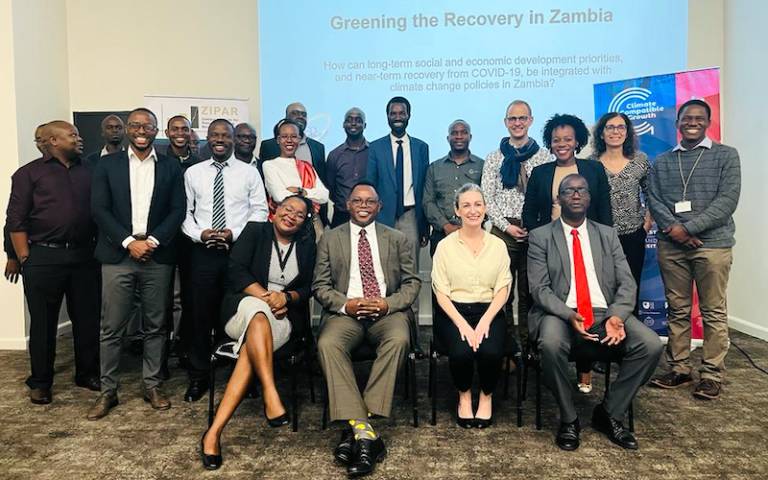UCL collaborates on recommendations for Zambia's Green Growth Strategy
21 March 2023
UCL researchers have published their two-year collaborative report on 'Greening the Recovery in Zambia'

The Zambian government is developing a new Green Growth Strategy, which is part of its aspiration to become a prosperous middle income country by 2030.
New research from UCL, the Zambia Institute for Policy Analysis and Research and the University of Ghana is feeding directly into the development of this new strategy. The final report, 'Greening the Recovery in Zambia', is a key outcome from a two-year research collaborative research project funded by UK Research and Innovation (UKRI).
The report includes four key recommendations for the Zambian government:
- It is essential to coordinate across sectors in planning and preparedness to enhance resilience, and to take advantage of emerging opportunities. This is also required to address the challenges of climate change, Covid-19 recovery and national debt in an integrated way.
- There is a need to devolve decision-making and planning in Zambia, and to involve a greater diversity of stakeholders. There is a particular need for capacity building within local authorities, investment in R&D to support local economic activities and the promotion of decentralised energy systems.
- Attracting green finance is essential to enable Zambia to transition into a climate- resilient and inclusive green economy. State and non-state actors must work together to achieve this.
- Zambia needs to build human capacity, invest in skills, and support innovation in the green economy. A green recovery represents an opportunity to generate the skills and capacity needed to support in areas such as renewable energy innovation.
In February 2023, an event was held in Lusaka to discuss the project findings. It included participants from various government ministries, the private sector, non-governmental organisations, and universities. They commented on the importance of the participatory approach adopted by the project. The workshop also discussed how the results could be taken further. Suggestions include the need to deepen analysis of particular sectors, such as mining, and to make the project's scenario development tools into ‘living’ products that can be used by others. This collaborative research will be taken forward via the Climate Compatible Growth (CCG) programme.
Jim Watson noted:
Like many low income countries, Zambia faces many significant development challenges. This research has helped the government and other stakeholders to explore how Zambia can integrate climate action into its economic and social development plans. We are particularly pleased that our work is helping the Zambian government to develop their new Green Growth Strategy.
The project team consisted of researchers and experts from UCL Institute for Sustainable Resources, UCL Energy Institute and the Department of Science, Technology, Engineering and Public Policy (STEaPP), led by Professor Jim Watson. The UCL team have collaborated throughout the project with teams from the Zambia Institute for Policy Analysis and Research and the University of Ghana. The funder is UKRI via the Global Challenges Research Fund (GCRF).
Links:
- To learn more about the project, go here.
- To learn more about the Climate Compatible Growth programme, go here.
- To read the report, go here.
Image credit: Willard Mapulanga
 Close
Close

